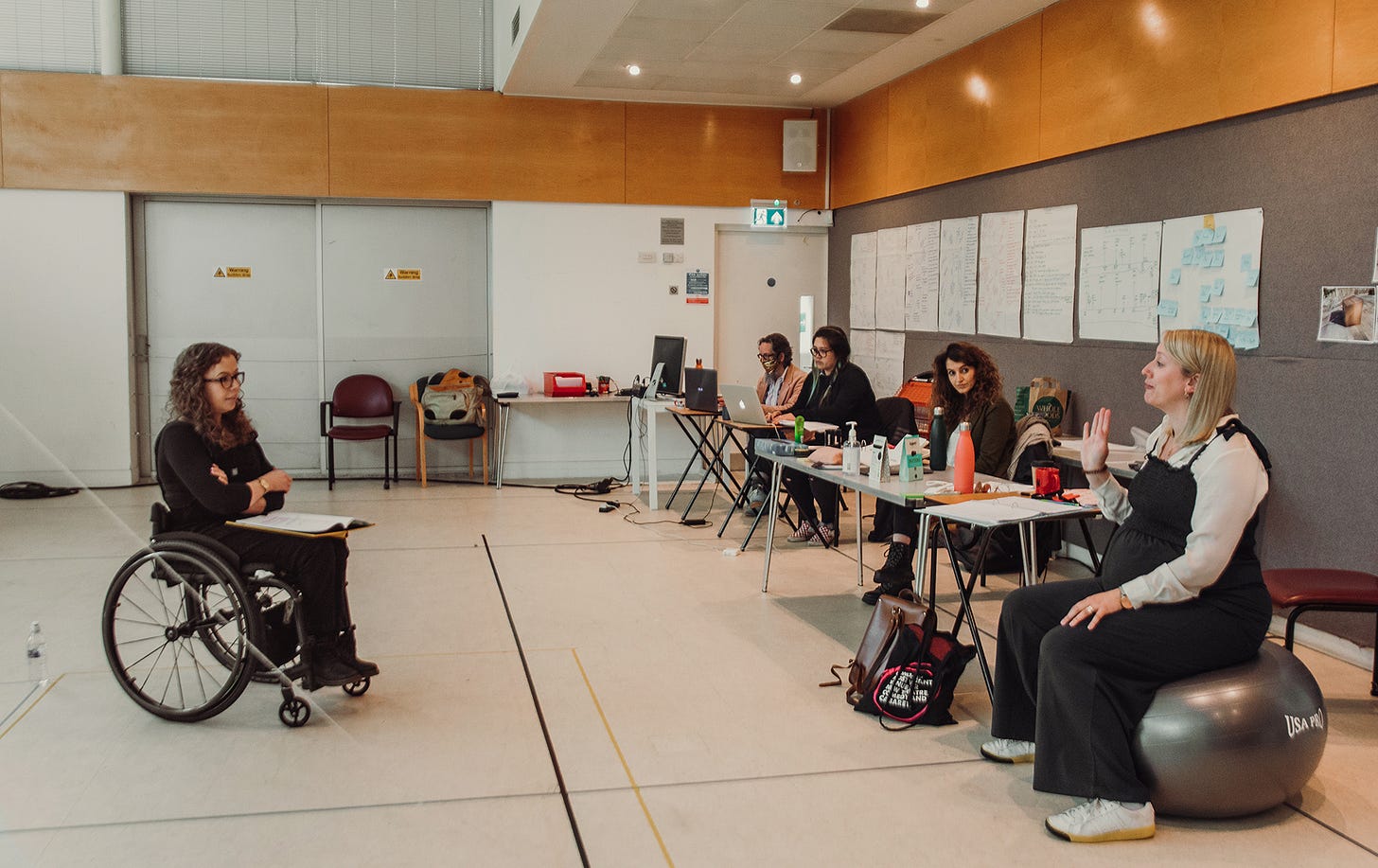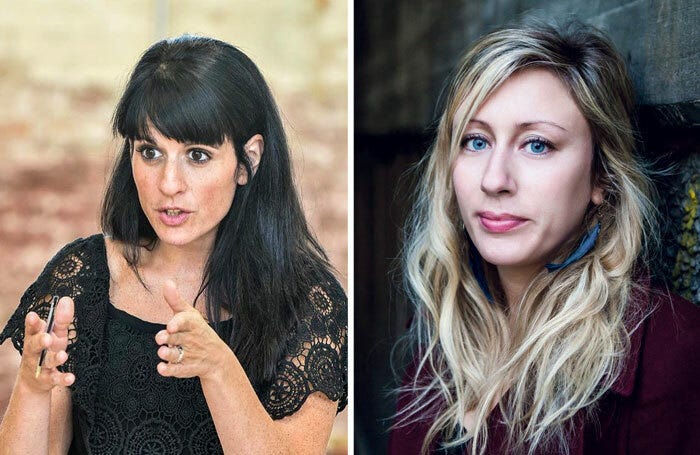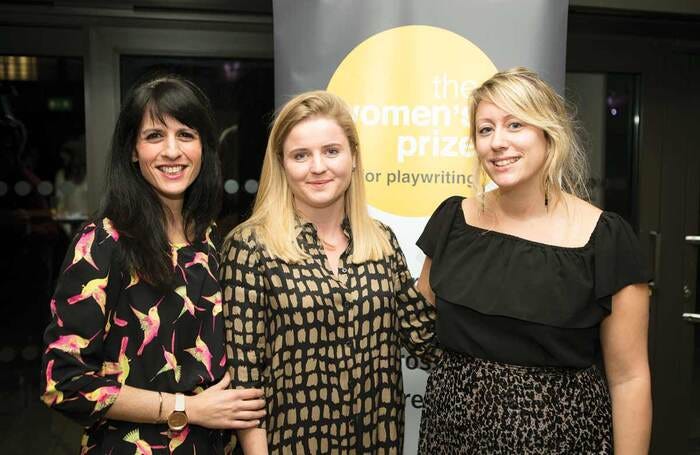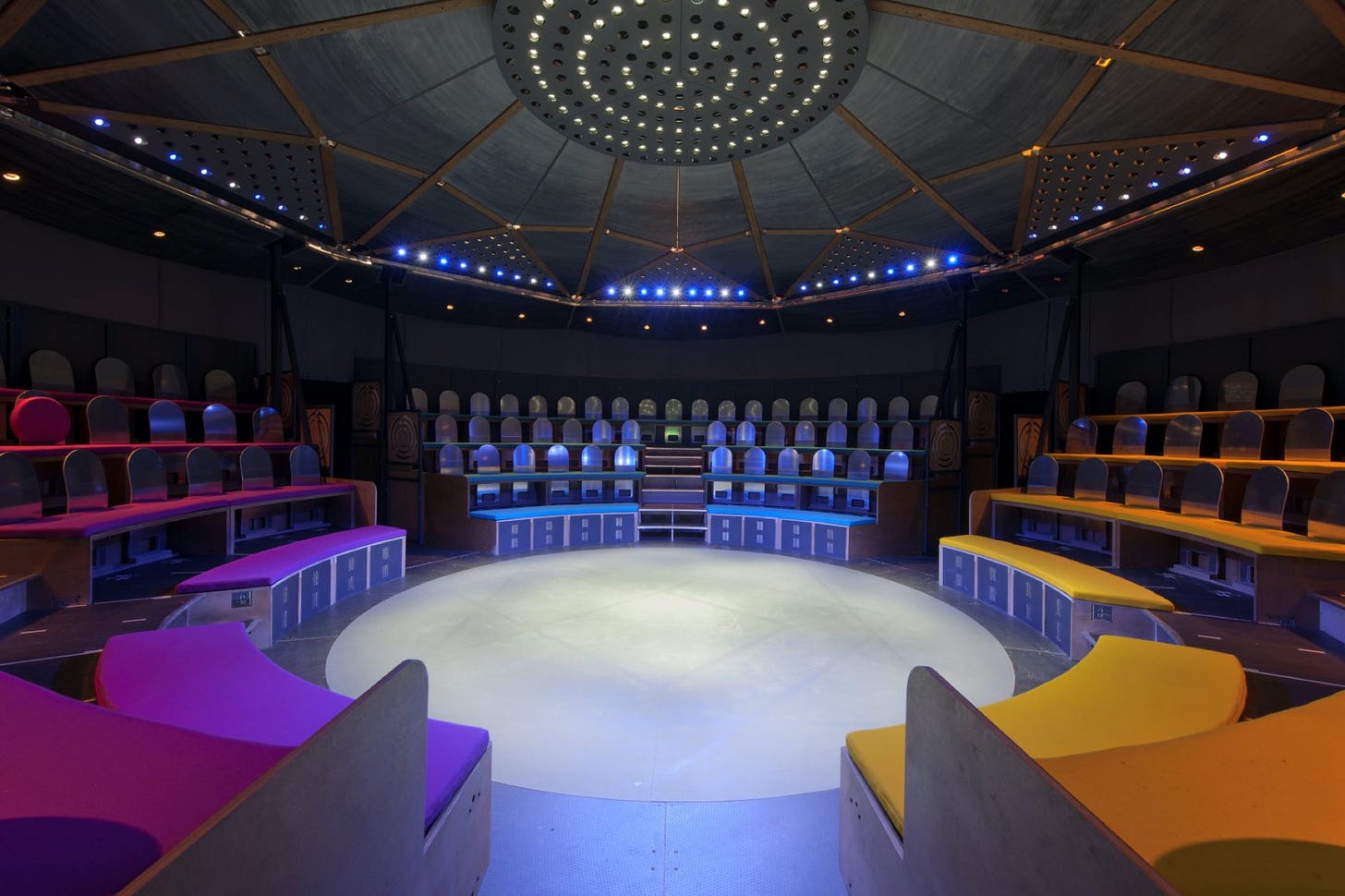Charlotte Bennett and Katie Posner - artistic directors, Paines Plough
On what it means to run a genuinely national theatre.
Hello there…
And sorry for sending this out a few days late. I had a bit of a dog disaster last week, which involved an emergency vet trip, which meant I didn’t have a chance to put this together until the weekend. All is okay now, though, on the canine front. Hope you’re week was less stressful than mine.
Anyway, welcome to tenth (woohoo!) issue of The Crush Bar, my fortnightly newsletter about theatre and the people that make it. If you haven’t subscribed already then please…
Below, you’ll find an interview with the Charlotte Bennett and Katie Posner of Paines Plough - one of the indisputable jewels of British theatre, and a company that actually earns the moniker “national”. I’ve lost count of the number of amazing plays I’ve seen Paines Plough produce over the last few years, and its touring Roundabout Theatre is probably my favourite performance space in the country.
Charlotte, Katie and I spoke over Zoom last Wednesday, Katie from her home near Huntingdon, and Charlotte from a room at the Kiln, where she is currently directing Amy Trigg’s Reasons You Should(n’t) Love Me, opening May 21. More on that below. For now, though, it’d be great if you could smash the share button below…
Right, that’s all for now. See you at the bottom…
Interview: Charlotte Bennett and Katie Posner
In 1974, writer David Pownall and director John Adams shared a pint in a Bedford pub and decided to form a theatre company. The name of the beer they were drinking? Paines. The name of the pub? The Plough. Paines Plough – the name they consequently settled on – has been touring new writing around the country ever since.
Forty-four years later, Katie Posner and Charlotte Bennett stood in the rain outside Paines Plough’s office in Aldwych and dreamed of running the company together. They even took a selfie to mark the moment. A few months later, in mid-2019, that dream came true when they succeeded James Grieve and George Perrin as artistic directors.
“I love the photo we took that day,” says Posner. “We’d always talked about doing something together, and we often imagined it being Paines Plough, but never thought that was particularly tangible. Then the job came up.”
“We had to have some really honest conversations at that point,” adds Bennett. “Did we want to actually apply for it? Did we want to apply for it together? Did we want to apply for it as individuals? Then Katie had a bit of a wobble, and that made us both realise that we did want to do it, but that we only wanted to do it with each other.”
“We are a writers’ company. We are a national company. We have a national audience…”
Posner and Bennett took over in August 2019 and announced their inaugural season in October. They were halfway through the first run of their first show - Chloë Moss’s Run Sister Run at Sheffield Crucible’s Studio – when coronavirus forced the closure of theatres nationwide last March. Less than a year into their tenure, and Posner and Bennett faced a fearsome test of leadership.
“We mourned the programme that we had worked on and lost, and then we sat down together and decided what was important to us – financially and organisationally, of course, but also creatively,” says Bennett. “We are a writers’ company. We are a national company. We have a national audience. We had to find a way of still doing those things.”
There were two main strands to the digital work Paines Plough did over the last year. The company built upon its long-running project Come To Where I’m From with new initiative Come To Where I Am, through which writers created mini-plays about wherever they found themselves during lockdown. It also created The Place I Call Home, a two-week digital festival featuring three international, bilingual plays performed via WhatsApp, email and the post.
That is not all. The company also launched Re:Build, a support package designed to help emerging companies develop organisationally, and Re:Assemble, a professional development programme for under-represented writers and dramaturgs. It collaborated with the Freelance Task Force to better understand how it could support self-employed theatre professionals through the pandemic, and it published statistics on who it had employed over the previous six years in an effort to improve transparency, and hold itself to account over issues of diversity.
“There’s been a lot of rhetoric about theatre being closed over the last year,” says Bennett. “Well, yes, stages and buildings were closed, but companies weren’t. We stayed open. We still had a responsibility to the people we work with, and to our audience.”
“It was so helpful having you throughout this situation,” she adds, to Posner. “I don’t know what I’d have done if it had been me on my own.”
“I went to a careers fair and told someone that I wanted to be a theatre director and they laughed in my face…”
Neither Bennett nor Posner wanted to be directors, initially. Bennett grew up in Yorkshire and studied drama at the University of Hull. She quickly realised she was “terrible” at acting and turned to directing instead.
“I went to a careers fair and told someone that I wanted to be a theatre director and they laughed in my face,” she says. “They also said I would struggle as a northern woman. I actually turned that into my dissertation. I wrote about routes into directing for women, and through my research I interviewed loads of amazing female directors. Suddenly I had a whole wave of role models to look up to.”
Posner, meanwhile, grew up on the outskirts of London. Her dad was a tap-dancer, a musical-lover, and a “wannabee comedian”, and it was his influence that pushed Posner to become an actor. She was 28 when she discovered that she actually preferred directing.
“I was also a terrible actor,” Posner says. “And I was probably quite annoying, too. I found it really difficult to think about my own character in a play. I’d always be thinking about the play instead, and what the other actors were doing. When I started directing, I realised there was a space where that instinct could guide me.”
Bennett and Posner met in 2009, while simultaneously directing different shows at York Theatre Royal. Posner was associate director of Pilot Theatre, Bennett was artistic director of Forward Theatre Project. They realised they were “interested and excited by the same things”, and became “informal mentors” to each other, visiting each other’s rehearsals and giving feedback on each other’s shows.
Those shared values – championing new writing from diverse writers, touring work to regional audiences, and responding to political and social issues – have found a natural home at Paines Plough. The company has a long and proud history of promoting British playwrights – from James Graham, to Sarah Kane, to Vinay Patel, to Kae Tempest – and of collaborating with myriad co-producers to take those writers’ work around the country.
“Paines Plough has truly national theatre model,” says Bennett. “We never work alone. We tour to every corner of the country, and we don’t just show up in a town and do our own thing. We work with venues year-round on audience development initiatives. We invest in areas in a meaningful way and the impact is real. People have come up to me and told me that they became an actor because Paines Plough toured to their town when they were younger.”
“You can’t be passive as an audience member in the Roundabout. You have to be active…”
In recent years, its most recognisable initiative has been the Roundabout, the pop-up theatre created by Bennett and Posner’s predecessors. Fully accessible and fitting into a lorry, the 168-seat, in-the-round venue has migrated around the country every year since 2014, partnering with local venues to produce an annual season of several stripped-back new plays. It is one of the most intimate and exciting theatre spaces in the country, and the beating heart of the Edinburgh Fringe every August.
“You can’t be passive as an audience member in the Roundabout,” says Posner. “You have to be active. There’s an immediacy that you can’t deny – a feeling that you are sharing something together. It has an amazing energy.”
“Plus, the outside doesn’t look anything like the inside, so there’s a huge pay-off when you walk in,” adds Bennett. “It’s like the Tardis.”

Now, thanks partly to an £85,000 Culture Recovery Fund grant, Paines Plough are firmly focussed on in-person productions again. Their 2021 season features several shows originally slated for last year – including plays by Phoebe Eclair-Powell and Chris Bush, and a new musical, Black Love – in the Roundabout. The company is collaborating with Coventry UK City of Culture 2021, Tiata Fahodzi, Soho Theatre, Trybe House Theatre, and others, and all its tours included integrated charity and community initiatives - an introduction of Bennett and Posner.
It all kicks off at Kilburn’s Kiln Theatre, though, with Amy Trigg’s Reasons You Should(n’t) Love Me, the inaugural winner of the Women’s Prize for Playwriting, another project Paines Plough has been part of over the past year.
“The prize was set up to do something about the disparity between female playwrights and male playwrights, particularly on main stages,” explains Posner. “The producer Ellie Keel approached us about it a while ago, and we couldn’t believe it didn’t exist already. It was a no-brainer when she asked us if we wanted to be involved.”
The prize was ultimately organised by Keel, Paines Plough, Sonia Friedman, and production company 45North. The judges included playwright Ella Hickson, LAMDA director Sarah Frankcom, and Kiln artistic director Indhu Rubasingham, whose theatre then agreed to produce Trigg’s prize-winning play. Bennett – eight months pregnant – is currently deep in rehearsals ahead of its opening in late May.
“It was very important that the prize wasn’t just a prize, and that it culminated in a production because it is producing work by women that is important,” says Posner. “And now, thanks to the prize, we have this amazing resource for other theatres. A long list of brilliant plays – big, small, experimental, naturalistic, whatever – all by brilliant women.”
“It is a privilege to run this organisation, and it comes with a responsibility to give a shit about people…”
Twenty-one months – and one global pandemic – into their tenure as artistic directors of Paines Plough, and both Posner and Bennett feel like they are still just getting started. Their experiences over the last year have had an impact on them, though, and on their approach to leading the company out the other side of the coronavirus crisis.
“This year has really revealed the injustice and inequality that exists in every single part of our society, and it has challenged us to do something about it,” says Posner. “It is a privilege to run this organisation, and it comes with a responsibility to give a shit about people and act. And we want to do that through kind, compassionate, female leadership.”
“The most helpful thing people could do is…”
Charlotte: “Use less jargon. I sit in so many meeting and feel stupid because I have no idea what people are saying. It’s because when people talk about inclusivity and diversity and things, they talk about it with a layer of jargon that is, ironically, not inclusive at all. Just fucking say what you want to say!”
Posner: “Develop genuine connections to communities. People brandish the word ‘community’ around quite confidently, without really recognising what it means, and the responsibility it involves.”
Bits and bobs, shouts and murmurs…
Since we last met, I had the pleasure of interviewing the actor Samuel West, and drag queen/cabaret star/musical theatre actor extaordinaire Le Gateau Chocolat. Both were very nice and said very interesting things.
The BBC sneakily announced the cutting of another radio drama slot this week - the fifteen-minute drama, which has been replaced by fifteen more minutes of Women’s Hour. It is, in my opinion, a huge shame, particularly when audio work is enjoying such a surge of attention. The writer Martin Jameson puts it very well here on his blog. As does Caroline Raphael here.
I knew about the Alfred Fagon Award, but I didn’t know about the man behind it and his extraordinary life. Arifa Akbar’s piece in the Guardian rectified that.
Nina Segal - interviewee number seven - is in the Young Vic’s new season! She’s collaborating with Chinonyerem Odimba and a computer to write an AI play!
And you can now see William Grint - interviewee number nine - in the RSC’s filmed production of The Winter’s Tale on iPlayer!
And Alice Boyd - interviewee number two - has made some “mushroom-inspired music” for Spore Score, an audio piece she co-created with Emergency Chorus for Oxford’s North Wall Arts Centre.
My sister has set up an online auction to raise money for Care International, who are helping to vaccinate people in the developing world. She works in publishing, so it is mostly book-related stuff, but do check it out and bid on some goodies. She’s raised over £10,000 already. And if you are a writer of plays or books, get in touch with her to donate something!
Until next time…
Thanks for reading. Thanks for subscribing. Thanks for sharing. The next issue will be along - pending any other canine catastrophes - on Friday May 21, and it is going to feature an interview with none other than David Byrne, artistic director of the New Diorama Theatre, and godfather of the UK fringe theatre industry.
Meanwhile, if you want to get in touch for any reason, you can just reply to this email, or contact me on Twitter - I’m @FergusMorgan. Right. That’s your lot. Bye.
Fergus x





